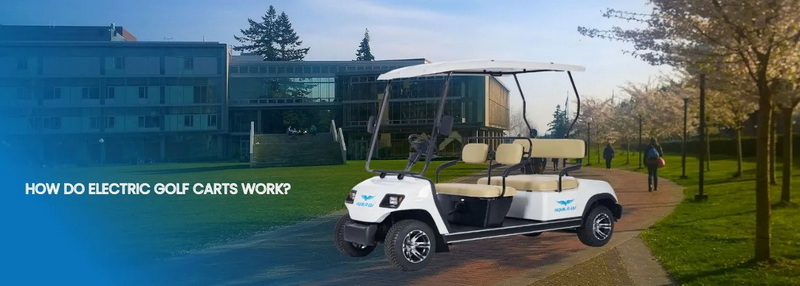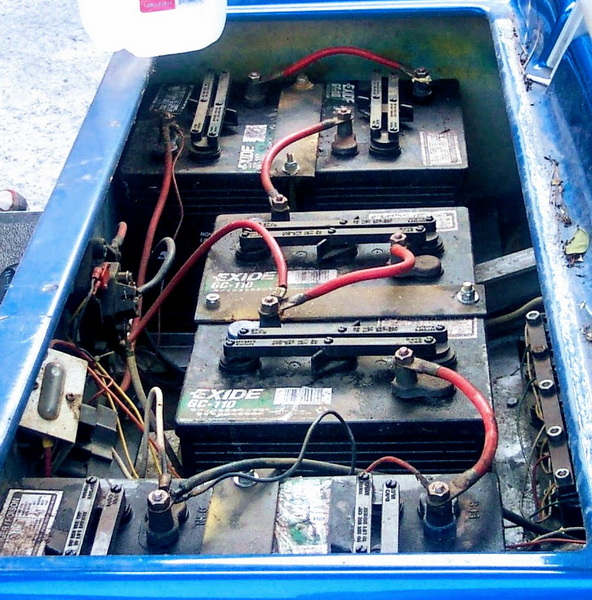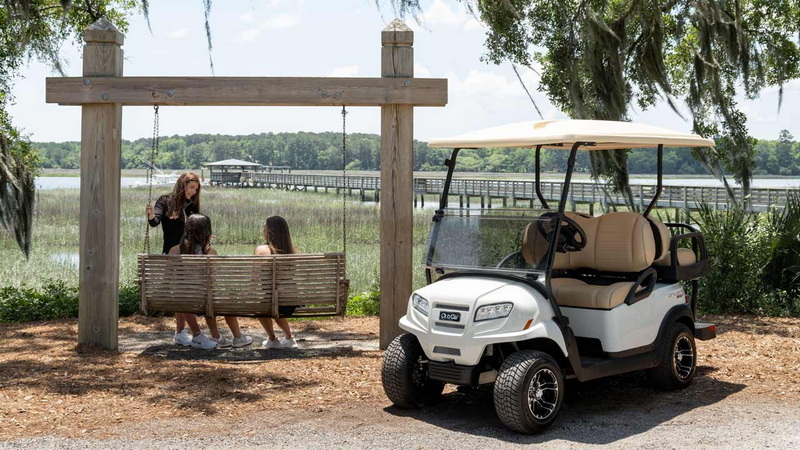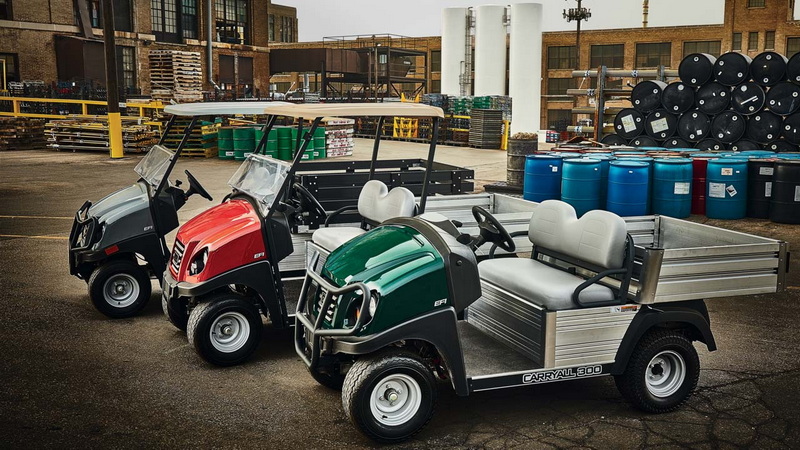Content Menu
● The Heart of the System: Electric Motor
● Power Source: Battery Pack
● The Brain: On-Board Computer (OBC)
● Charging System
● Controller: The Power Regulator
● Drivetrain and Wheels
● Regenerative Braking System
● Steering and Suspension
● Body and Frame
● Safety Features
● How It All Works Together
● Maintenance and Care
● Environmental Benefits
● Conclusion
● Frequently Asked Questions
>> 1. How long does a Club Car electric golf cart battery last?
>> 2. What is the range of a Club Car electric golf cart on a single charge?
>> 3. How fast can a Club Car electric golf cart go?
>> 4. Can I upgrade my Club Car golf cart to lithium-ion batteries?
>> 5. Are Club Car electric golf carts street legal?
Electric golf carts have become increasingly popular due to their quiet operation, eco-friendliness, and low maintenance requirements. Club Car, a leading manufacturer of golf carts and utility vehicles, offers a range of electric models that are both efficient and reliable. In this article, we'll explore the inner workings of a Club Car electric golf cart, its key components, and how they all come together to provide a smooth and enjoyable ride.

The Heart of the System: Electric Motor
At the core of every Club Car electric golf cart is its electric motor. This crucial component converts electrical energy from the batteries into mechanical energy, which propels the cart forward or backward.
Club Car typically uses AC (alternating current) motors in their modern electric golf carts. These motors offer several advantages:
1. Higher efficiency
2. Better performance
3. Reduced maintenance requirements
4. Improved energy conservation
The motor is connected to the wheels through a drivetrain system, which includes gears and axles. When you press the accelerator pedal, it signals the motor to draw more power from the batteries, increasing the cart's speed.
Power Source: Battery Pack
The battery pack is the energy reservoir of an electric golf cart. Club Car's latest models, such as the Tempo, feature advanced lithium-ion battery technology.
Lithium-ion batteries offer several benefits over traditional lead-acid batteries:
- Longer lifespan
- Faster charging times
- Lighter weight
- Improved performance in various weather conditions
- Zero maintenance requirements
A typical Club Car electric golf cart battery pack consists of multiple lithium-ion cells connected in series to provide the necessary voltage (usually 48 volts) to power the motor and other electrical systems.
The Brain: On-Board Computer (OBC)
The On-Board Computer (OBC) acts as the central nervous system of a Club Car electric golf cart. This sophisticated device manages various aspects of the cart's operation, including:
1. Battery charge regulation
2. Motor control
3. Speed management
4. Energy consumption monitoring
The OBC ensures optimal performance by constantly monitoring the battery's state of charge and adjusting power output accordingly. It also plays a crucial role in the charging process, communicating with the charger to deliver the right amount of energy to the batteries.
Charging System
Club Car electric golf carts come with a built-in charging system that allows for easy recharging of the battery pack. The latest models feature the ERIC (Efficient, Reliable, Intelligent & Connected) charging system.
This advanced charging system offers:
- Wide voltage range (85-270V)
- Automatic cutoff when fully charged
- Visual and audible indicators for charging status
- Aluminum housing for durability
To charge the golf cart, simply plug the charger into a standard 110V outlet. The OBC and charging system work together to ensure the batteries are charged efficiently and safely.
Controller: The Power Regulator
The controller acts as an intermediary between the batteries, motor, and accelerator pedal. It regulates the flow of electricity from the batteries to the motor based on input from the accelerator and other sensors.
Key functions of the controller include:
- Managing acceleration and deceleration
- Controlling regenerative braking
- Protecting the motor and batteries from overload
- Optimizing energy efficiency
Drivetrain and Wheels
The drivetrain system transfers power from the electric motor to the wheels. In most Club Car electric golf carts, this is achieved through a direct drive system with a single-speed reduction gearbox.
The wheels are typically made of durable materials like aluminum or steel and are designed to provide a smooth ride on various terrains. Many Club Car models feature independent front suspension for improved comfort and handling.
Regenerative Braking System
One of the innovative features of modern Club Car electric golf carts is the regenerative braking system. This technology allows the cart to recover energy during braking or coasting downhill.
When the brake is applied or the accelerator is released, the electric motor switches to generator mode, converting kinetic energy back into electrical energy. This energy is then fed back into the battery pack, extending the cart's range and improving overall efficiency.
Steering and Suspension
Club Car electric golf carts use a rack and pinion steering system, similar to that found in automobiles. This provides responsive and precise steering control.
The suspension system, which typically includes shock absorbers and leaf springs, ensures a comfortable ride by absorbing bumps and vibrations from uneven terrain.

Body and Frame
The body and frame of a Club Car electric golf cart are designed for durability and longevity. Many models feature:
- Rustproof aluminum frame
- Impact-resistant body panels
- Powder-coated finish for added protection
These design elements contribute to the cart's overall strength and resistance to wear and tear, even in challenging environments like golf courses or residential communities.
Safety Features
Club Car incorporates various safety features into their electric golf carts to ensure rider protection:
1. Automatic parking brake
2. Headlights and taillights for improved visibility
3. Turn signals (on street-legal models)
4. Seat belts (on certain models)
5. Horn
Additionally, the OBC includes safety mechanisms that prevent the cart from moving while charging and limit the maximum speed to ensure safe operation.
How It All Works Together
Now that we've explored the individual components, let's see how they work together to power a Club Car electric golf cart:
1. When you turn the key or press the power button, the OBC activates the electrical system.
2. As you press the accelerator pedal, the controller regulates the flow of electricity from the batteries to the motor.
3. The electric motor converts this electrical energy into mechanical energy, turning the drivetrain.
4. The drivetrain transfers power to the wheels, propelling the cart forward or backward.
5. When you release the accelerator or apply the brake, the regenerative braking system engages, slowing the cart and recovering energy.
6. Throughout operation, the OBC monitors various parameters to ensure optimal performance and safety.
Here's a video demonstrating how an electric golf cart works:
Maintenance and Care
While Club Car electric golf carts are designed for low maintenance, proper care can significantly extend their lifespan and ensure optimal performance:
1. Regular cleaning to prevent dirt and debris buildup
2. Checking tire pressure and condition
3. Inspecting brake system components
4. Lubricating moving parts as recommended by the manufacturer
5. Storing the cart in a dry, covered area when not in use
For lithium-ion battery models, maintenance is even simpler, as these batteries don't require watering or equalization charges like traditional lead-acid batteries.
Environmental Benefits
Club Car electric golf carts offer several environmental advantages:
- Zero emissions during operation
- Lower noise pollution compared to gas-powered carts
- Energy efficiency through regenerative braking and advanced motor technology
- Reduced dependence on fossil fuels
These benefits make electric golf carts an excellent choice for eco-conscious individuals and organizations looking to reduce their carbon footprint.
Conclusion
Club Car electric golf carts represent a harmonious blend of advanced technology and practical design. From the powerful yet efficient electric motor to the sophisticated On-Board Computer and innovative lithium-ion batteries, each component plays a crucial role in delivering a smooth, reliable, and environmentally friendly ride.
As technology continues to advance, we can expect to see even more improvements in electric golf cart design, further enhancing their performance, range, and sustainability. Whether you're navigating a golf course, exploring a residential community, or tackling light utility tasks, a Club Car electric golf cart offers a quiet, efficient, and enjoyable solution.

Frequently Asked Questions
1. How long does a Club Car electric golf cart battery last?
The lifespan of a Club Car electric golf cart battery depends on several factors, including the type of battery, usage patterns, and maintenance. Traditional lead-acid batteries typically last 4-6 years with proper care, while newer lithium-ion batteries can last 8-10 years or more. Regular charging and avoiding deep discharges can help extend battery life.
2. What is the range of a Club Car electric golf cart on a single charge?
The range of a Club Car electric golf cart varies depending on the model, battery type, terrain, and driving conditions. On average, you can expect:
- Lead-acid battery models: 15-25 miles
- Lithium-ion battery models: 30-50 miles
Keep in mind that factors like hilly terrain, heavy loads, and extreme temperatures can affect the range.
3. How fast can a Club Car electric golf cart go?
Most Club Car electric golf carts have a top speed of 15-19 mph (24-30 km/h) for safety reasons. However, some models designed for street use or specific applications may have higher top speeds. It's important to note that many golf courses and communities have speed restrictions for golf carts.
4. Can I upgrade my Club Car golf cart to lithium-ion batteries?
Yes, many Club Car golf cart models can be upgraded to lithium-ion batteries. This upgrade can offer benefits such as longer range, faster charging times, and reduced maintenance. However, it's essential to ensure compatibility with your specific model and consider professional installation to maintain warranty coverage and ensure proper integration with the cart's systems.
5. Are Club Car electric golf carts street legal?
Some Club Car electric golf cart models are designed to be street legal, but this depends on local regulations and the specific features of the cart. Street-legal models typically include additional safety features such as headlights, taillights, turn signals, seat belts, and a speedometer. Always check your local laws and regulations regarding golf cart use on public roads before operating one outside of designated areas.











































